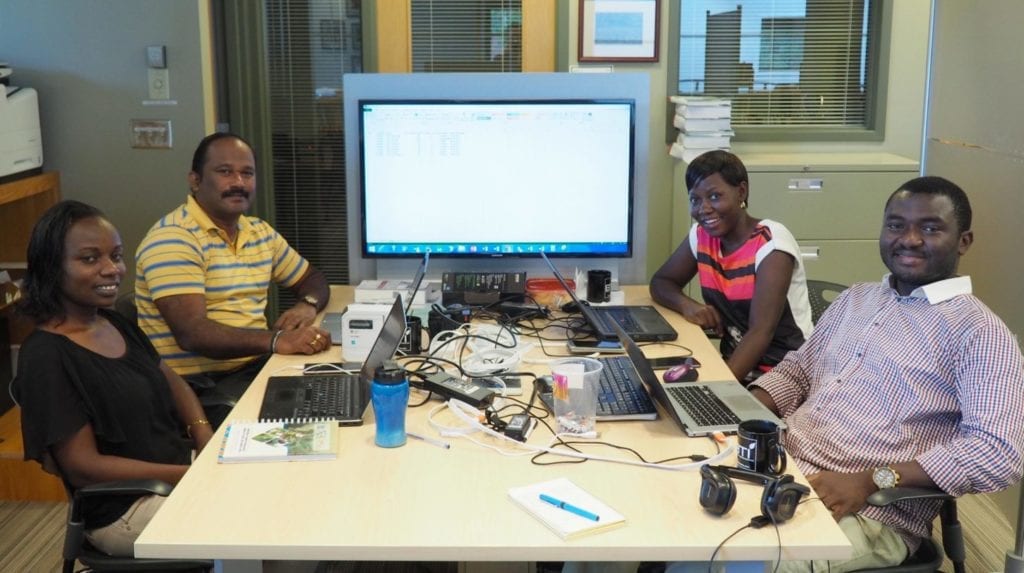News
BTI’s Mueller Lab and visiting researchers collaborate to improve important crop databases

Visiting researchers hard at work in the BTI Resource Center. From left to right: Margaret Karanja (IITA Nairobi), Prasad Peteti (IITA Nigeria), Racheal Mukisa (NaCRRI Uganda), and Afolabi Agbona (IITA Nigeria).
During June and July at BTI, visiting researchers from crop breeding programs in Nigeria, Nairobi, and Uganda have been working closely with researchers in Lukas Mueller’s group to discuss ways to improve the development of online resources related to two of Africa’s most important staple crops: cassava and banana. The websites under development, CassavaBase and MusaBase, serve as an invaluable platform for resource and data sharing by researchers around the world who are working with these crops.
The objective of CassavaBase is to, “develop a centralized, user-friendly and reliable database that can provide a ‘one-stop shop’ for cassava researchers and breeders across the globe,” explained Prasad Peteti from the International Institute of Tropical Agriculture in Nigeria (IITA). MusaBase serves as a parallel resource for researchers and breeders of banana, which is from the genus Musa.
“Visits such as these are indispensable for creating databases and software that meet the needs of the users,” asserted Mueller, the lead BTI faculty on the project.
Racheal Mukisa from the National Crops Resources Research Institute (NaCRRI) in Uganda described the importance of the visit for her institute. “As a data curator and manager for CassavaBase on behalf of Uganda, exchange visits such as this with the BTI development team are crucial for sharing user feedback to better system usability, quick resolution of database concerns that require hands-on, and serves as a refresher for learning new system concepts,” asserted Mukisa.
While here, the researchers addressed a variety of issues, including additions to the ontologies (the vocabulary used to describe traits throughout the programs), establishment of electronic systems for pollination tracking, and providing feedback on how BTI could improve the database to make it more useful for the breeding programs.
Afolabi Agbona, also from IITA Nigeria, elaborated on the visit’s importance for IITA, which is currently hosting a mirror website for the CassavaBase database. He explained, “In a few years to come, we will be hosting the production server, and major changes in the code base will be done from our end. Learning the process now is thus important.”
Cassava (Manihot esculenta) is a major food source for 500 million people around the world, providing food security throughout Sub-Saharan Africa. Furthermore, with low nutrient-inputs, excellent drought tolerance, and a profound ability to grow in marginal soils, cassava is gaining importance throughout the world as temperatures continue to rise.
While three of the four visitors focus on cassava research, Margaret Karanja from IITA in Nairobi is here to further develop MusaBase. “Banana is a major food crop in East Africa for consumption and commercial [use],” explained Karanja. “Despite being relied on by many, little research has been done because bananas are difficult to breed.” Programs like CassavaBase and MusaBase will make breeding and improvement of these crops much easier for scientists around the world.
“BTI has cultivated a good working environment, good team work, quick feedback, commitment and support,” Karanja reflected about her visit. “I have established new contacts which I’m sure will bring the success of these projects and future collaborations.”
All four researchers look forward to returning to Ithaca and BTI for another visit soon.


